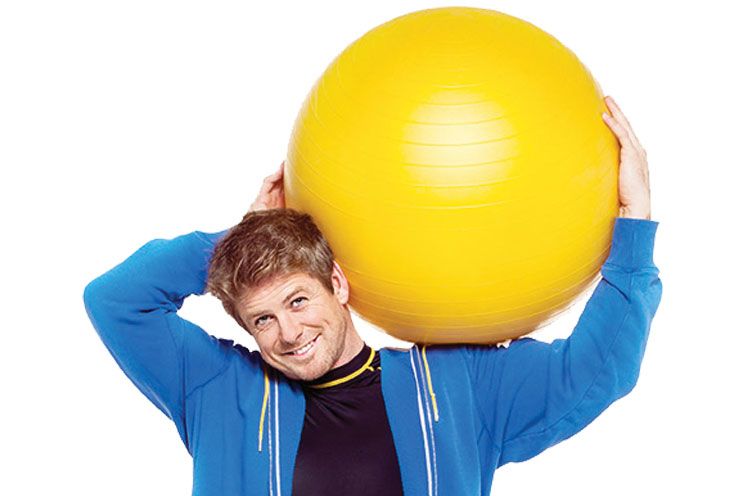Fit body, fit skin
Andrew Dunne, Managing Director and Physiotherapist at Personal Health, discusses the importance of exercise and fitness for your skin health.
Andrew Dunne, Managing Director and Physiotherapist at Personal Health, discusses the importance of exercise and fitness for your skin health.
Fit body, fit skin
Andrew Dunne, Managing Director and Physiotherapist at Personal Health, discusses the importance of exercise and fitness for your skin health.

The importance of general fitness and exercise in order to maintain good health is well understood, yet most people only review their fitness levels when they are trying to achieve a physically challenging goal or looking to lose weight. However, exercise is key to all areas of our health, even when it comes to skin care.
Andrew Dunne is a former professional rugby union player who works in the area of prescriptive exercise – the specific plan of fitness-related activities for clients or patients. In his experience, exercise has a transformative role in people’s general health. “What if your doctor said: ‘A few pills is better than none. Take a couple most of the time. Try not to miss many days in a row’? This vague approach to prescription medicine would not instill you with confidence. Well, the same goes for exercise. It needs to be prescribed effectively. The dosage is really important. Too high a dosage can be problematic. And too little exercise can have adverse effects on our muscle tissue, cardiac health, lung function, bone density, cognition and much more. Exercise is an incredibly beneficial medicine; a medicine that has transformative effects on human function.”
Andrew has witnessed first-hand the importance of exercise with many of his clients and their health. “I have been working with a 52-year-old female patient who had open heart surgery. She had post-operative complications and spent three weeks in ICU. Having battled cancer, radiation therapy had caused some damage to her lung tissue and a resultant lung fibrosis. So, she was compromised significantly in terms of exercise tolerance. However, this lady has an incredible attitude to life, let alone exercise. And with exercise she is determined to manage her health on her own terms. Since her cardiologist cleared her to commence physiotherapy, she has exercised twice weekly at home during Covid-19 and as a result, her systolic blood pressure has nicely regulated. Similarly, her resting heart rate has reduced, signalling a marked improvement in her aerobic fitness. She has managed to achieve significant improvement in two of her vital signs – all without leaving her kitchen!”
The transformative effect of a suitable exercise prescription is something that Andrew believes can also positively affect skin health: “How can exercise affect our largest vital organ - the skin? By increasing blood flow, exercise helps carry oxygen to tissues all over the body, including the skin. This oxygen is transported to nourish our skin cells. And the improved blood flow from exercising also helps flush debris out of the system. Much like getting the bins collected! We have a really effective transport system. Skin benefits from the fresh oxygen delivery. And, at a cellular level, those little bin trucks are helping transport waste product away from the skin.”
At a chemical and hormonal level too, he continues, exercise also plays a helpful role for the skin. “As we exercise, we produce serotonin – the happy hormone. Its increased presence from exercise usually sees a resultant drop in cortisol - the stress hormone. One goes up and one goes down. This may not be an overly scientific observation but working in healthcare has driven one message home to me regularly - increased happiness and reduced stress is good for you! We can see it in the skin, the eyes, our laughter, our sleep patterns, mood, energy levels and so much more.
“Author Ron Hall once said ‘good medicine always tastes bad’. And in life lots of the reward we get is from hard work and sacrifice. The same is true of our health. It’s not always the easiest option to hydrate, exercise, sleep well and eat sensibly. There is no magic wand. But I don’t believe I have seen anybody’s skin deteriorate who does these things well.”
Andrew is an alumnus of the Royal College of Surgeons and initially worked in Orthopaedics with the Sports Surgery Clinic in Dublin. In May 2013, Andrew began work as lead physiotherapist in professional cricket, including consultancy positions with the Caribbean Premier League and Cricket Ireland. He toured the West Indies, Dubai and Bangladesh with the Irish National team, enjoying the professional challenges of the T20 Cricket World Cup in April 2014.
Andrew has a sporting background in professional rugby, and a playing career interrupted by injury initially prompted his interest in musculoskeletal physiotherapy.